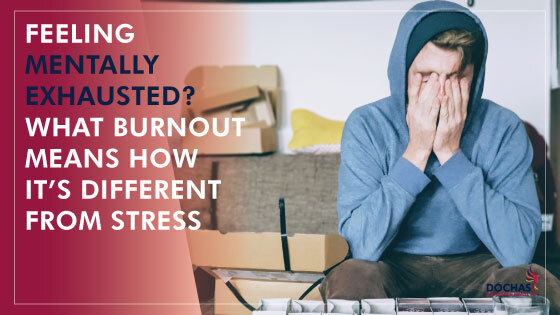Welcome back to the blog! It’s Pooja here.
With the events of this past year, it’s no surprise that you might be feeling down. Mentally drained, emotionally exhausted, and perhaps, burnt out are some other descriptions that might fit how you’re feeling right now. The term burnout seems to be a go-to these days, and while burnout is common, it’s more serious than people might think. Exhaustion and stress are no joke. But it’s important to know the difference between burnout and other types of stress so you can manage your symptoms properly. In this blog I’m sharing some background information on what burnout means, how to identify symptoms, and what characterizes burnout versus stress.
What burnout means
Sometimes burnout becomes a “throw-away” term to mean exhaustion or stress, or it’s used as a badge of honor. Most people have experienced a time where they feel overworked, or like they don’t have much more to give. But there’s a huge difference between a short period of stress and actual burnout. Take a look at this video for a great explanation of how burnout is misunderstood.
Burnout is caused by a prolonged exposure and/or experience of stress. Maslach, Schaufeli and Leiter (2001) list 3 areas burnout can be characterized by:
1) Depersonalization or disengagement
This is when a person distances themselves mentally. They might develop a negative feeling, or even a numbness towards someone or something.
2) Emotional exhaustion
This is the cognitive, affective and physical strain that happens to a person as a consequence of something.
3) Reduced sense of accomplishment
This occurs when someone regards their achievements or outcomes differently, despite all the energy and effort they’ve put in.
Early signs of burnout
Guntupalli, Watchell, Mallampalli and Surani (2016) identify some early signs that indicate you may be suffering from burnout syndrome. These include:
- Chronic fatigue, exhaustion and tiredness
- Unusual forgetfulness
- Increase in risk-taking behaviours
- Bursts of anger and self-criticism
- Sense of being overwhelmed
- Cynicism, negativity and irritability
- Feeling suspicious
- Feeling detached from a group
- Feeling helpless
The difference between burnout and stress
So how do you know if what you’re feeling is burnout, stress, or something entirely different?
One of the key differences between burnout and stress is the psychological and physical symptoms a person experiences. Things like fatigue, difficulty concentrating, fluctuation in appetite, and moodiness are common signs of stress. Someone who experiences stress can even feel guilty for their reduction in commitments. Stress causes a number of psychological changes like increased heart rate and blood pressure, and it’s common for someone to get sick after a short period of stress. If any of these sound familiar, click here to read our blog on how to deal with physical stress symptoms.
Burnout is more severe than stress. In addition to the early signs I mentioned above, someone who suffers from burnout can experience chronic exhaustion both mentally and physically, develop anxiety, encounter mental depression, and contract illnesses easily and frequently. It’s also common for someone to become mentally detached from the things and people they love, and to suddenly experience irritability and an unwillingness to talk or engage with others.
Other possible causes of exhaustion
I know, there is a ton of symptoms to consider and it can feel overwhelming! Just because someone feels exhausted in some form or another doesn’t necessarily mean it’s burnout or stress. There are other reasons why a person could experience exhaustion or fatigue.
Compassion fatigue is a common cause of this. It’s experienced when someone is working with others who require high levels of support and eventually, compassion and empathy diminish. There’s also vicarious trauma, which occurs when someone’s experience of trauma can activate feelings of stress, burnout or trauma in another person.
Give yourself the care you deserve
If something in this blog resonated with you, whether you feel fatigued, stressed, or just not yourself, remember that you’re not alone. Burnout and stress can severely affect you – it’s okay to ask for help!
We are happy to be that source of help. Feel free to contact us at info@dochaspsych.com or check out our website for more information on how therapy might be the right fit for you.
About Dochas Psychological
Dochas Psychological Services is a well-established and trusted therapy clinic located in Spruce Grove, Alberta. At Dochas we value the idea that everyone deserves a safe space. Through connection and education, our team works hard to build a trustworthy relationship with each of our clients. It is our goal to create a community for our clients to feel like they belong.
Disclaimer
Information provided through Dochas Psychological Services blogs or vlogs are meant for educational purposes only. They are NOT medical or mental health advice. You can read more about our disclaimer here.



